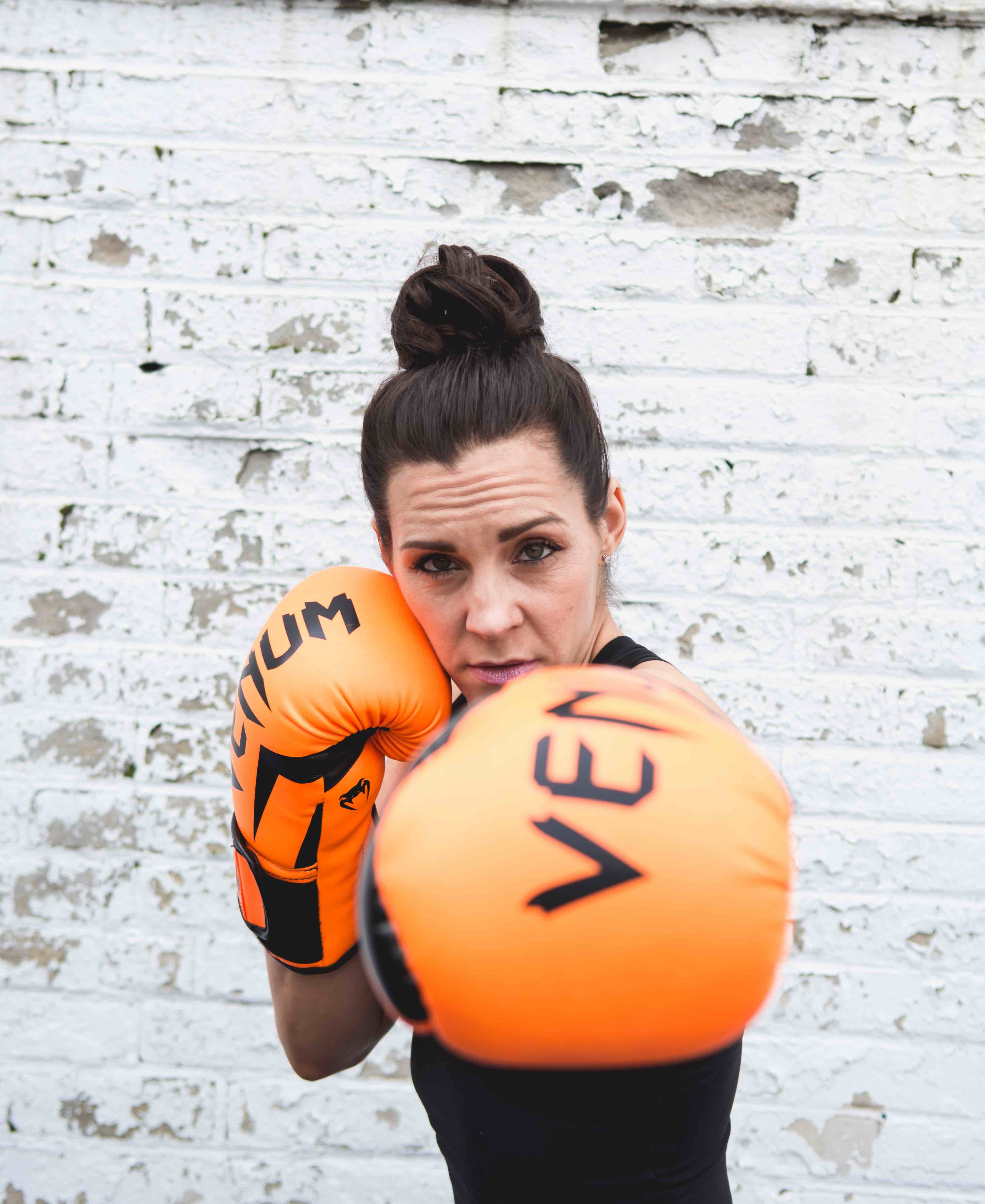How This Ardmore Fitness Entrepreneur Came to Terms With Her Chronic Disease
Fuel Cycle Fitness co-founder Jen Cohen Crompton doesn't let her digestive issues keep her down.

Jen Cohen Crompton, owner of Ardmore fitness studio Fuel Cycle Fitness, struggled with accepting her chronic disease — until she realized it wasn’t going to go away. / Photograph by KMS Fotografie/courtesy Jen Cohen Crompton
Want to share your Transformation story? Email mfischer@phillymag.com.
Who: Jen Cohen Crompton, 36, @jencocrompton, entrepreneur and co-owner of Fuel Cycle Fitness from the Havertown/Ardmore area
Why I wanted to make a change: In 2008, I was diagnosed with ulcerative colitis (UC) [a chronic disease that inflames the digestive tract] after a few years of digestive issues. I was going through some life changes, and I think the stress triggered my first official “flare.” It — sorry for the pun — scared the crap of out of me. I had a colonoscopy (what would be the first of many) and was prescribed medicine to control the issue.
Fast forward to 2014 when I was pregnant with my son and stopped taking the meds. I was worried about the health of my baby, and my doctor explained that the chances of me getting a flare during pregnancy were low, so it would be OK. Fast forward another three years to July of 2017 when my stress hit an ultimate high. I wasn’t back on the meds, and the perfect storm of craziness put me back into a gradual flare, which I denied and ignored until six months ago, when it was almost unbearable.
At that time, I suffered everything from being doubled over in pain to not sleeping because my stomach pains would wake me up. I would have to use the restroom 15 or more times within the first two hours of waking up. I would skip lunch, so I wouldn’t be worried about having to run to the bathroom, and I removed all vegetables and “healthy” foods that were regulars in my diet and replaced them with unhealthier — but digestible — options.
This led me down a road to feeling awful. I wasn’t eating well. I wasn’t able to keep my energy levels high enough since I wasn’t absorbing nutrients. I felt defeated and exhausted.
Then, finally, after a day when I couldn’t teach my cycle class and was doubled over in pain, I decided that I had to do something. With the encouragement from my husband (Jeff), my family, and some incredible friends, I was forced to start focusing inward on my personal health. My daily struggles were truly getting in the way of my routine, my family, and my business. Jeff and others encouraged me to practice more self-care and reminded me that I needed to be my best before I could give my best to everyone else. Oddly, this is something I preach to others. So when my words were tossed back in my face, I had to eat them — and they were something I could actually digest and absorb.
How I changed my diet: At first, I was so overwhelmed with the options. What could I digest? What would make me feel OK? Worse? I had no idea where to begin, so I reached out to a nutritionist through Simplex Health. The consultation and subsequent meetings were covered under my insurance, so I didn’t feel guilty spending money out of pocket to consult with a professional.
Once I discussed my issues, I was able to understand how to track my intake as well as what was making my condition worse and what would make it better. To start, I had to eliminate vegetables and foods with a lot of fiber. That drastically changed my food options. I ended up eating more pasta, rice, and “white” foods, which aren’t so great in terms of nutrition, but they were digestible. I also tried cutting sugary foods and processed foods, but that was incredibly challenging since I couldn’t replace those with vegetables, and my fruit options were limited. I did, however, start supplementing my food intake with juices from Katie over at the Juice Philly. Her strawberry lemon juices were the solution to my sweet tooth, and the Chill Pill has recently been my go-to before bedtime. Overall, I still can’t binge on fruits and vegetables or enjoy a nice hearty salad, but I am slowly adding variety and taking note of how those foods make me feel so I can get back to a more balanced regimen.
How I changed my medication: Around the same time I saw a nutritionist, I was prescribed steroids to get my inflammation and bleeding under control. I started with a low dose, but it didn’t work. So I ended up taking 30 milligrams of Prednisone — something I had mixed feelings about. And this is how my actual transformation began…
When I started taking the steroids, I experienced all the side effects I was warned about: weight gain, moon face, insatiable hunger, insomnia. I remember waking up one day at 2.30 a.m. and going to the studio to get work done because I was so wired and couldn’t sleep. I gained weight, and my face looked like I was hiding food in my cheeks for an impending snowstorm.
But I was feeling better. I was able to function as a human and could make it through breakfast and two classes without running to the restroom. And that was a huge step and something I needed to keep in mind. Despite all of the outer physical changes, my inner changes had to be my immediate focus. I had to be willing to give up the concern about weight, complexion, and anything else that you could see, to make the changes within my body that only I could feel.
How I changed my workouts: When it came to working out, I had to scale back and not push as hard. As an instructor, most of my classes require (well, in my head they “require”) me to work out alongside my class. While the workout isn’t for me, I always felt that I brought the most energy when I was working just as hard as they were, and it was my way of encouraging them through my actions. (If I can do it, you can do it!) However, this just wasn’t feasible for me to do for 20ish classes a week due to my UC. So I had to accept that my energy would be best spent being a coach, which meant I would have to be OK with taking breaks and breaths as needed. It’s interesting because I can always tell people in my classes to take it at their own pace and do what they can, but when I give myself the same advice, I have to check my ego at the door.
How I changed overall: I’ve learned the importance of putting my health first, even if it means making other sacrifices. While I wasn’t excited about gaining weight from the meds or having a less-than-perfect complexion, it was what I had to accept. I learned that everything is temporary. In the words of my mother-in-law, it was how I looked that day. It’s not how I was going to look tomorrow or how I would look in five days. In a world — and in an industry — where everyone is focusing on being their own best version, my best version required a few extra pounds and some help from modern science.
When I started: I’ve had this chronic disease for more than 10 years, but now I am just starting to focus on managing it. From meds to diet to a more holistic approach, this transformation is not only about what I am putting into my body, but it is also about how I see the world. I have to change my perspective on what stresses me out because I know stress is a trigger. I have to understand that vanity has to take a backseat when there are more pressing things to be concerned about. I have to remember that social media is full of unrealistic, unreal images that are nothing to aspire to.
The hardest part: Getting started and admitting that I truly did have a medical condition that needed attention, and it wasn’t just going to “go away” with time. My support system, their push to hold me accountable was what really made me take the next steps. The other part was deciding to not give other people’s opinions an ounce of my energy — because I didn’t have enough of it to begin with so I started using it for more useful things.
What I want everyone to know: I think this is the kind of thing many of us go through, but we don’t discuss it. I want people going through this to feel less alone. We don’t really say to people, “Wow, you’ve gained x pounds, and you look great. You must be feeling healthy.’ If you want your personal health or happiness to transform, go for it — and don’t stop until you feel you’ve made it. But don’t forget that you’re not only looking for the light. You also need to enjoy the signals sending you in the right direction.


